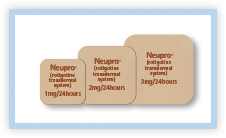NEUPRO is a prescription medicine used to treat moderate-to-severe primary Restless Legs Syndrome.
NEUPRO is indicated for the treatment of moderate‐to‐severe primary Restless Legs Syndrome.
NEUPRO contains a sulfite called sodium metabisulfite. Sulfites can cause severe allergic reactions that are life threatening to some people who are sensitive to sulfites. People with asthma are more sensitive to sulfites. Remove the patch right away and call your doctor if you have swelling of the lips or tongue, chest pain, or trouble breathing or swallowing.
NEUPRO may make you fall asleep suddenly or without warning while doing normal activities, such as driving, which may result in accidents. Tell your doctor right away if this happens. Drinking alcohol or taking other medicines that cause drowsiness may increase your chances of becoming sleepy while using NEUPRO. Do not drive, use hazardous machinery, or do other dangerous activities until you know how NEUPRO affects you.
NEUPRO can cause psychotic symptoms including hallucinations (seeing or hearing things that are not real), confusion, excessive suspicion, aggressive behavior, agitation, delusional beliefs (believing things that are not real), and disorganized thinking. If you have hallucinations or any of these other psychotic‐like changes, talk with your doctor right away.
NEUPRO can cause decreases in blood pressure, especially when you start or increase your dose. Increases in blood pressure and heart rate, and fainting, also can occur. If you faint or feel dizzy, nauseated, or sweaty when you stand up from sitting or lying down, tell your doctor.
Some patients using NEUPRO get urges to behave in a way that is unusual for them, such as unusual urges to gamble, strong urges to spend money, binge eating, or increased sexual urges and behaviors. Some patients may want to use more NEUPRO than prescribed for their symptoms (dopamine dysregulation syndrome). If you or your family notices you are developing any unusual behaviors, talk to your doctor.
NEUPRO may cause Restless Legs Syndrome symptoms to come back (rebound), become worse, or start earlier in the day.
Skin reactions may occur at the site where you apply NEUPRO. Tell your doctor if you get a rash, redness, swelling, or itching that will not go away.
Avoid exposing the NEUPRO patch you are wearing to heating pads, electric blankets, heat lamps, saunas, hot tubs, heated water beds, and direct sunlight. Too much medicine could be absorbed into your body. Also, do not wear NEUPRO during medical procedures called magnetic resonance imaging (MRI) or cardioversion because this could cause skin burns.
Do not stop using NEUPRO without talking to your doctor first. If your doctor tells you to stop using NEUPRO, you should ask your doctor for specific instructions on how to slowly and safely discontinue using NEUPRO. If you stop using NEUPRO, you may have withdrawal symptoms such as fever, confusion, severe muscle stiffness, feeling like you do not care about the things you usually care about (apathy), anxiety, depression, fatigue, insomnia, sweating and pain.
Tell your doctor if you have breathing problems, a sleep disorder, mental problems, high or low blood pressure, or heart problems; are pregnant or plan to become pregnant; or are breastfeeding or plan to breastfeed. NEUPRO may not be right for you.
The most common side effects in people taking NEUPRO for Restless Legs Syndrome are application site reactions, nausea, difficulty falling asleep and staying asleep, sleepiness, and headache.
These are not all the possible side effects of NEUPRO. For more information, ask your doctor or pharmacist.
You are encouraged to report negative side effects of prescription drugs to the FDA. Visit www.fda.gov/medwatch or call 1-800-FDA-1088. You may also report side effects to UCB, Inc. at ucbCARES® (1-844-599-2273).
Please see additional Patient Information about the NEUPRO Patch. This information does not take the place of talking with your healthcare provider about your condition or treatment.
NEUPRO contains sodium metabisulfite, a sulfite that may cause allergic-type reactions including anaphylactic symptoms and life-threatening or less severe asthmatic episodes in certain susceptible people and is seen more frequently in people with asthma.
Patients treated with NEUPRO have reported somnolence and falling asleep without warning signs during activities of daily living, including driving, which sometimes resulted in accidents. Some patients believed they were alert immediately prior to the event. Patients may not recognize or acknowledge increased drowsiness or sleepiness. Therefore, prescribers should directly question patients about these possible occurrences and continually reassess patients, as some events have been reported well after the start of treatment. Patients should be advised to exercise caution while driving, operating heavy machinery, or working at heights during treatment with NEUPRO. If patients develop daytime sleepiness or episodes of falling asleep during activities of daily living, NEUPRO should be discontinued.
Patients may experience new or worsening mental status and behavioral changes, which may be severe, including psychotic behavior during NEUPRO treatment or after starting or increasing the dose of NEUPRO.
NEUPRO may cause symptomatic postural/orthostatic hypotension. Patients treated with dopamine agonists require careful monitoring for signs and symptoms of postural hypotension, especially during dose escalation, and should be informed of this risk. NEUPRO may also cause syncope, elevated blood pressure, and elevated heart rate. These events should be considered when treating patients with cardiovascular disease or concomitant illness.
Patients may experience intense urges to gamble, increased sexual urges, intense urges to spend money, binge eating, and other intense urges, and the inability to control these urges while taking medications, including NEUPRO, that increase central dopaminergic tone. Dopamine dysregulation syndrome, the repeated use of more NEUPRO than as prescribed to manage symptoms, was observed in some patients during treatment with NEUPRO. Because patients may not recognize these behaviors as abnormal, prescribers should specifically ask patients and their caregivers about the development of new or increased urges while being treated with NEUPRO. Dose reduction or discontinuation of NEUPRO should be considered if such urges develop.
NEUPRO can cause application site reactions, and some may be severe. In clinical trials, most reactions were mild or moderate in intensity and were limited to the patch area.
Use of dopaminergic medications, including NEUPRO, may cause augmentation and rebound.
NEUPRO should be removed before magnetic resonance imaging or cardioversion, because the aluminum backing layer in the patch could cause skin burns. Heat application has been shown to increase absorption several fold with other transdermal products. Therefore, patients should be advised to avoid exposing the application site to sources of direct heat, such as heating pads or electric blankets, heat lamps, saunas, hot tubs, heated water beds, and prolonged direct sunlight.
Withdrawal symptoms such as apathy, anxiety, depression, fatigue, insomnia, sweating and pain may occur during taper or after discontinuation of NEUPRO. Patients who have been prescribed a lower dose or who have been withdrawn from the drug should be informed about potential withdrawal symptoms and monitored during and after discontinuation.
The most common adverse reactions (at least 5% greater than placebo) for NEUPRO in the treatment of Restless Legs Syndrome are application site reactions, nausea, disturbances in initiating and maintaining sleep, somnolence, and headache.
Please see full Prescribing Information.



